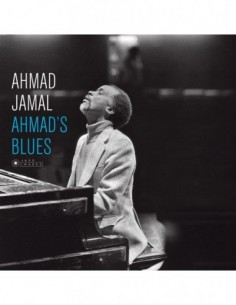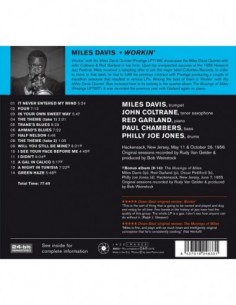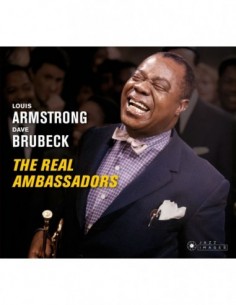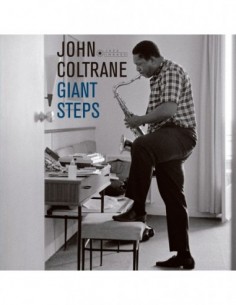Meets Oscar Peterson
Louis Armstrong• THE JEAN-PIERRE LELOIR COLLECTION
• 3-PANEL DIGIPACK EDITION
"Louis Armstrong Meets Oscar Peterson" (Verve MGV-8322) presents Satchmo singing and playing standards that were not part of his usual repertoire. He was masterfully backed on the album by Peterson, Herb Ellis, Ray Brown and Louis Bellson. With the exception of the sessions the two musicians made with Ella Fitzgerald, Peterson and Armstrong would never record together again. This sort of accompaniment is unique in Armstrong’s discography, but it’s not the only thing that makes this album important. Of equal significance is the fact that Louis had never previously recorded the majority of the wonderful standard songs selected by Granz, andwould never record them again.
PERSONNEL:
- LOUIS ARMSTRONG, vocals & trumpet
- OSCAR PETERSON, piano
- HERB ELLIS, guitar
- RAY BROWN, bass
- LOUIS BELLSON, drums
Chicago, October 14, 1957.
(*) BONUS TRACKS:
- Same personnel, Los Angeles, July 31, 1957.
TRACKS:
- 01 THAT OLD FEELING
- 02 LET’S FALL IN LOVE
- 03 I’LL NEVER BE THE SAME
- 04 BLUES IN THE NIGHT
- 05 HOW LONG HAS THIS BEEN GOING ON?
- 06 I WAS DOING ALL RIGHT
- 07 WHAT’S NEW?
- 08 MOON SONG
- 09 JUST ONE OF THOSE THINGS
- 10 THERE’S NO YOU
- 11 YOU GO TO MY HEAD
- 12 SWEET LORRAINE
- 13 I GET A KICK OUT OF YOU (*)
- 14 MAKIN’ WHOOPEE (*)
- 15 WILLOW WEEP FOR ME (*)
- 16 LET’S DO IT (LET’S FALL IN LOVE) (*)
- TOTAL TIME: 71:16 Min.
- Format
- CD
- Discs
- 1
- Label code
- 24742

Louis Armstrong
In every jazz collection, and even for any jazzman in training or already consecrated, the name of Louis Armstrong is placed on the podium of the most important artists of the genre from its beginnings to the present day
And the fact is that Satchmo and Pops, as he was also known, left a legacy as a trumpeter and singer of the most unique, turning jazz, which was considered a dance music rhythm, into a consolidated artistic manifestation.
Who is not moved when listening to Louis Armstrong: What a wonderful world? And if you get to see him sing this song, where Louis seems to embody with his heartbreaking voice and his eloquent teeth every sound, every word, every feeling... Is it possible not to take a leap in time and be enraptured by his music? It is totally worthwhile to know him, to have his music, to leave him in a privileged place in our musical preferences. Louis Armstrong 1920s and other years surprised us with his art.
BIOGRAPHY
The story of Louis Armstrong (Trumpet, vocalist, cornet) is the classic tale of the child who grows up in poverty, commits petty crimes and is a victim of racial segregation, only to be saved and redeemed by his talents, in this case his musical talent. So this man is born in a New Orleans slum and after being abandoned by his father and left in the care of his grandmother, he suddenly finds himself working for a family of Lithuanian Jews, the Karnofskys, who took the boy as a member of their family.
The Karnofskys were decisive in the life of little Louis. For some reason they insisted on strengthening his taste for music, keeping him away from the problems of the street. Even when Armstrong was summoned by music, the same family gave him his first trumpet.
For Louis Armstrong, "jazz" was just a word he heard from the New Orleans brass bands. He learned to play the cornet in the reformatory, with the New Orleans Home for Colored Waifs band, and when he left there, after doing all kinds of jobs, he managed to get into cabarets in Storyville where nightclubs abounded. He then managed to meet the renowned cornetist Joe King Oliver, his instrumental master and almost father, as he later considered him.
Like many musicians, Louis Armstrong (Satchmo) migrated to Chicago to join King Oliver's Creole Jazz band and then moved to New York, where he came to the attention of Fletcher Henderson, who hired him in his orchestra. It was in New York where Louis switched to the trumpet, debuted with it at the Roseland Ballroom and revolutionized jazz with a unique and innovative style, until he achieved the prestige that accompanied him for the rest of his life.
MUSICAL INFLUENCES
In music, popularity is synonymous with innovation and Louis Armstrong was, above all, an innovator. It can be said that his entry into the American Jazz scene is part of the invention of jazz singing, supported by his marvelous capacity for melodic improvisation and his talent for scat, improvisation of nonsense syllables.
Names such as Frank Sinatra, Bing Crosby and Billie Holiday, are an example of the repertoire of musicians who were influenced by Louis. His legacy and musical contributions left an indelible mark on the jazz voices and bands that emerged after his appearance. In fact, after Louis Armstrong, the trumpet became a solo instrument, a participation that only served to accompany the rest of the orchestra's performances.
COLLABORATORS IN PERFORMANCE
The stars who collaborated with Louis Armstrong: Ella Fitzgerald, Bessie Smith, Bing Crosby, Fletcher Henderson, Duke Ellington, Jimmie Rodgers... In the case of Ella Fitzgerald and Louis Armstrong, both recorded three important albums: "Porgy and Bess", "Ella and Louis Again" and "Ella and Louis".
Other collaborations also include the participation of the film industry in the projection and promotion of Louis Armstrong's music. Films such as Good Morning, Twelve Monkeys and James Bond On Her Majesty 's Secret Service; Hello, Dolly; A son is born and High Society are part of the tapes that helped immortalize this New Orleans figure.
DISCOGRAPHY
A total of 31 albums were recorded by Louis Armstrong, although some of them were shared with other jazz stars.
Meet his most important repertoire in chronological order of appearance, given its relevance in terms of music and popularity:
1923: Clarence Williams' Blue Five (CSB)
1928: Hot Fives And Sevens, Vol. 3 (JSP)
1931: Stardust (Portrait)
1956: Ella and Louis (Polygram Records)
1956: High society
1957: Porgy & Bess (Polygram Records)
1957: Ella and Louis Again (Polygram Records)
1957: Meets Oscar Peterson
1960: Happy Birthday, Louis! Armstrong & His All-Stars (Omega)
1961: The Great Summit
1962: The Real Ambassadors W/ Dave Brubeck
1963: Hello, Dolly! (Mca)
1968: What a Wonderful World (ABC Records)
1968: Disney Songs the Satchmo Way (Disney)
1969: On Her Majesty's Secret Service (Capitol).
MOST FAMOUS SONG
Among the undisputed hits of this jazzman are: "Louis Armstrong: Hello, Dolly", the classic Louis Armstrong music: "What a Wonderful World", and productions such as: "We Have All the Time in the World", "Dream a Little Dream of Me", "Stardust", "When the Saints Go Marching In", "Stompin' at the Savoy", "Ain't Misbehavin", "La vie en rose", "Summertime", "Mack the Knife".
Then of course there are the songs with Ella Fitzgerald, Louis Armstrong and His Hot Five, and the classics recorded with his old mentor Joe Oliver. Even the song "Melancholy Blues", performed by Louis and Hot Seven, is currently traveling in space, inside the Voyager space probe, as part of the most precious human creations collected by the spacecraft, in case it ever has an encounter with other civilizations.
 Cookie preferences
Cookie preferences


























































